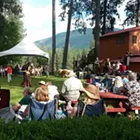Wanted: A science museum, with a 3D IMAX film theater inside. Paying tenant preferred. That's essentially what the Spokane Parks and Recreation Department Board will say when it begins soliciting potential developers and operators for a city science center. The center, if someday approved, would be located on the north bank of the Spokane River, adjacent to Riverfront Park.
"What we saw as the overall complexion of the north bank was arts, entertainment, amusement and an education-slash-exhibit center. And under that kind of generic category, a science center is an obvious candidate," says Steve McNutt, Park Board president and subcommittee member.
McNutt and four other Park Board members of the "North Bank Ad-Hoc Subcommittee" are looking at how to develop recreational activities there in conjunction with a park master plan. A science center and 3D IMAX theater (to replace the existing, aging IMAX park theater) would function as a sort of magnet attraction or anchor tenant, subcommittee members believe. Future north bank developments might include things like an ice skating rink and basketball courts.
"We need a critical mass of attractions up there to make this thing really come to life, and a magnet venue for people to want to go to," says McNutt.
Dennis Hession - who was a Park Board member long before his recent election to City Council - characterizes the science center and IMAX combination as a significant asset to the community. A north bank science center and theater also fits with the Park Board's vision of cultivating attractions on Riverfront Park's perimeter, leaving the interior as an urban refuge.
Hession says: "As a central feature it would be outstanding."
Once a Carnation dairy, the 5.66-acre parcel located immediately north of the river, across from 45 acre Riverfront Park. The north bank parcel is next door to the Spokane Arena parking lot, and within spitting distance of the Flour Mill shopping area. The Park Department purchased the land for $3.491 million in June 2000 from the Barbieri family company, according to Paul Crutchfield, the park staffer working with the subcommittee on the north bank plans.
Right now, the science center remains a conceptual twinkle in the Park Board's eye. Questions like when a center would go in the ground, who would operate it, and who would pick up the estimated $11 million-plus price tag have yet to be asked, let alone answered.
One way governments often begin asking those questions is by issuing a request for qualifications (RFQ), which is a fancy way of asking developers, non-profit groups and others for their resumes. An RFQ establishes that a private entity has some interest, and lays the foundation for more comprehensive planning. Subcommittee members say they're united in their support of an eventual science center on the North Bank, and that they will soon recommend that the full Park Board issue an RFQ. The RFQ timing is uncertain, though, with some saying it could be initiated as early as this week's board meeting, and others estimating it a number of weeks away.
Spokane residents previously considered building a science center - this one a branch of Seattle's Pacific Science Center - at Riverfront Park. In September 1995, voters rejected that proposal by less than 1 percent. That proposal placed the science center smack in the middle of the park, not on a new lot across the river, as the current Park Board is considering. Opponents - notably including Steve Corker, a City Council member - cited the location as a central reason to defeat the measure then.
"I think all of the minor criticisms that upended it last time have been addressed," says McNutt. The current proposal won't disrupt the traditional park layout, for example, and will likely have better parking and access, he says. "I think the fundamental idea of the science center downtown is still a good one."
Corker says he agrees.
"I did not oppose a science center. I opposed placing it in the middle of the park... (Now), I think it would be a perfect complement," to other park attractions, he says.
That's not to say a science center is a done deal, Corker cautions. Financing of any plan could be a hurdle, particularly since previous Park Department officials essentially promised not to seek a bond issue for north bank attractions, he points out.
When supporters speak of the science center idea, they hearken to other cities' science centers - combinations of museums, research institutions and theaters. They note places like the Oregon Museum of Science and Industry in Portland, and Seattle's Pacific Science Center. At least two local nonprofit interests are pushing for a science center: Greater Spokane, and the newly formed Inland Northwest Science and Technology Center. Greater Spokane has helped coordinate Pacific Science Center (PSC) traveling exhibits through the Inland Northwest, including one on extraterrestrial life coming in March. That group, like Corker and others, favors PSC as an operator of a Spokane science center, given its track record, says Bob Sestero, Greater Spokane president.
"When push comes to shove, we just want a science center, because it would be good for Spokane," says Sestero.
Greater Spokane will be raising money to help chip in for costs associated with studying a Spokane science center. The group plans a Feb. 2 blacktie gala, with details forthcoming.















